In my book of writing experiences, The Writer’s Practice, I have an assignment titled “What If…?” that asks students to write an alternate history. Essentially, I ask them to take an event from the past, change some aspect of it, and the write forward from that point as to what they believe would have happened in this alternate timeline.
I found that it’s a good exercise at getting students to think analytically without worrying about research and outside evidence. Writing an alternate history, by definition, requires speculation because what you’re writing didn’t happen…obviously.
Some of you are asking why a first-year college writing teacher would want his students to be comfortable writing without worrying about research and outside evidence.
I’ll tell you why. One of the unfortunate behaviors I witnessed in students over the years, particularly when writing analytical essays that required engagement with research and sourcing is that they excessively deferred to those sources, producing what I would call “laundry list” essays where they would summarize what individual sources say, one after the other, without tying the sources together under an original argument. This is the behavior that had been rewarded throughout their schooling - essentially proving to a teacher that they read and vaguely understood something - so they often defaulted to those patterns.
I would dutifully give B and B- grades to these efforts while deep down believing we were all wasting each other’s time.
I wanted students thinking, rather than 100% relying on the thinking of others, so by asking them to make something up that was still the product of reasoning I could make them really think. They also weren’t allowed to just make any old stuff up. The goal was to create a plausible scenario within the parameters of the alternate history.
The example I use in the book is an alternate history where the Chicago Bulls do not draft Michael Jordan. As basketball fans may recall, Jordan was the 3rd pick in the 1984 NBA draft, following the consensus #1, Hakeem Olajuwon (Houston) and the next best seven-footer, Sam Bowie from the University of Kentucky (Portland).
The player who would go on to be the greatest of all-time was seen as a consolation prize. The potential implications of Michael Jordan starting his playing career as a Portland Trail Blazer instead of a Chicago Bull are amazing to consider. Would he have become the same transformative marketing sensation playing in the small market Portland whose games start after much of the country is in bed as he was in the large market in the middle of the country? Would the NBA have prospered to the same degree?
What about the city of Chicago? Not only were Chicago sports fans delighted by the success of the teams, but Jordan’s popularity and the team’s success was the main driver behind the building of the United Center, which led to the gentrification of the city’s entire west side.
The hardest part about writing an alternate history is finding a single thread to follow. The butterfly effect of the change kicks in and you start to see differences everywhere. It’s a good thinking exercise for students and they often produce really interesting stuff, particularly because I let them write about whatever they want.
The number of “what if’s” we could conjure that might have resulted in not having Donald Trump become president, and therefore not having taken over the Republican Party like a warlord, and therefore not putting him in position to become President again, and therefore not putting him in a position to pursue a nakedly authoritarian path, are nearly uncountable.
What if James Comey hadn’t announced his “investigation” into Hillary Clinton and the media hadn’t run with it like it was a major scandal?
What if Republicans at either of Trump’s impeachment trials had acted on what they know to be true - the man is not fit for office - and voted to convict, making him ineligible for another term?
What if Barack Obama had not mocked Trump at the White House Correspondents’ Dinner, thus fueling Trump’s desire for revenge?
What if The Apprentice had never seen the airwaves, thus denying Trump an opportunity to create an indisputably false impression that he is a savvy and successful businessman, rather than the serial failure with bankrupt casinos, fake universities, and a failed football league?
The Trump-specific what if’s seem infinite, but consider that you can go even further back and examine the structural factors that created a culture conducive to the rise of Trump.
What if Rupert Murdoch confined his right wing media empire to Australia and the UK creating a 24/7 propaganda outlet?
What if the Supreme Court hadn’t overturned campaign finance laws that have allowed billionaires to control the kind of information the public is exposed to during the election season?
What if we haven’t been living through the long decline of public institutions and people had so thoroughly lost faith in the ability of government to govern, that they wouldn’t see a reality show clown and criminal who already fomented one insurrection as a remotely credible candidate for President of the United States?
As I was listening to the most recent episode of The Ezra Klein Show podcast, I was brought short by a discussion of Bill Clinton, of all people, that made me believe we could even find a moment in his presidency where we could have broken the chain that has put us on the brink of a possible second Trump term.
Klein’s guest was Gary Gerstle, author of The Rise and Fall of the Neoliberal Order. I’ll let Ezra describe what that’s about:
Bill Clinton was the only Democratic president in this era of the neoliberal order. (Gerstle argues that Jimmy Carter was a transitional figure, which is why he had so much trouble governing effectively.) Clinton portrayed himself as the opposite of a big government liberal. In fact, as we are reminded by Gerstle during the podcast, Clinton said this at the January 1996 State of the Union Address, “The era of big government is over.”
This is not quite Ronald Reagan’s nine most terrifying words in English, “I’m from the government, and I’m here to help,” but it’s not far off.
Before that most famous line of Clinton’s he also said this: “We know big government does not have all the answers. We know there's not a program for every problem.”
Unfortunately, over the course of the last 30 years, this has evolved into, there’s not a government program for any problem, which has led to a steady erosion of the overall trust in institutions, which has led to a potentially critical mass of voters declaring, for the second time, “fuck it,” let’s put the maniac in charge.
People have lost faith in the government as a vehicle for improving the lives of the citizenry, and so some of them are ready to just give up on the whole democracy thing. There’s lots of examples of these government failures, but I’ll use one I’ve written about many times at my Inside Higher Ed blog: The cost of college.
In 2018, I wrote “Free College or Bust,” arguing that the increasing costs of college had broken the bargain we promised citizens, that if you work hard and get an education, there is opportunity on the other side of that equation. The only way forward was to make public higher education institutions tuition-free. Because we broke that bargain, I also started calling for the cancellation of existing student loan debt to go along with free public college. This is from 2020:
While I also argue in the piece that cancelling debt would be good politically, and “progressive,” (on balance), the core reason is to keep faith with the promises we make as a society.
Despite much resistance from both conservative and centrist camps, the Biden Administration has done a lot of good in relieving the excessive burden of student loan debt, good that I would not have though possible back in 2020. But it’s worth noting how little this good work, work which is undeniably tied to a vision for a society organized around fairness and collective thriving, seems to count when it comes to our politics. Right now, Kamala Harris is essentially running away from these achievements, but I predict, just as Obamacare has become quite popular (more than 60% favorable), people will feel similarly about debt cancellation, particularly as we see the fruits of this policy.
But this means little in terms of what happens Tuesday.
History hasn’t even happened yet and I’ve seen a half-dozen “pre-crimination” articles about what the Harris campaign has done wrong, e.g. not choosing Pennsylvania governor Josh Shapiro for VP. These are alternate histories before the fact, and if Harris does not win, I encourage everyone to ignore them. Considering alternate histories may be interesting thought exercises, but they don’t often do much to help us navigate the present or the future.
The question we have to grapple with is not why would Harris lose, but what is it that makes it possible for Trump to win an election?
A democracy should not be such fertile territory for an authoritarian, and yet, here we are.
Links
This week at the Chicago Tribune I wrote about Katherine Standefer, author of Lightning Flowers: My Journey to Uncover the Cost of Saving a Life, who is having a fourth birthday party for her book in order to have an experience denied by circumstances as the book’s release: a chance to celebrate with family, friends, and the reading community.
At Inside Higher Ed, I wrote about what we could view as another institutional failure, the way that higher ed institutions visit deliberate cruelty on non-tenure-track faculty.
This link comes courtesy of
’s newsletter this week, Chris Ware on Richard Scarry and the art of children’s literature. I previously expressed my own appreciation for Richard Scarry, my favorite author at age 6, in this newsletter post.At Esquire, Adrienne Westenfeld shares her list of the best books of fall.
Romance is definitely not an area of my expertise, so I’ve been taking small steps to develop a deeper appreciation of what is the most read genre of fiction. This episode of the Fated Mates podcast is a fascinating discussion of trends in the genre and how they may reflect things going on in the world today.
Publishers Weekly has released their list of the best books the year.
This week’s literary humor from Dan Cabrera via
, “Quoth the Baby, ‘Waah. Waah. Waah’”Recommendations
1. A Gentleman in Moscow by Amor Towles
2. Harry Potter and the Prisoner of Azkaban by J.K. Rowling
3. Paths of Glory by Jeffrey Archer
4. Winners Take All: The Elite Charade of Changing the World by Anand Giridharadas
5. The Time Traveler’s Wife by Audrey Niffenegger
Atin B. - Boston, MA
I think Atin is a good candidate for a fun and inventive thriller I read earlier this year, Assassins Anonymous by Rob Hart.1
Some alternate history novels
This is supposed to be a newsletter about books, so why not a quick list of alternate history novels that are Biblioracle recommended?
The Man in the High Castle by Philip K. Dick (The Axis powers win WWII.)
Rodham by Curtis Sittenfeld (Hillary Clinton never marries Bill, and still runs for President)
The Yiddish Policeman’s Union by Michael Chabon (Jewish refugees are settled in Alaska during WWII)
The Plot Against America by Philip Roth (Charles Lindbergh becomes President, collaborates with the Nazis.)
I guess war and politics make the best subjects for alternate histories. Let me know if anyone’s interested in an alternate history about Michael Jordan being drafted by the Portland Trail Blazers. I’ve put a lot of thought into it.
What are your favorite alternate histories?
This week’s pre-release endorsement for More Than Words: How to Think About Writing in the Age of AI is courtesy of
whose newsletter is mandatory reading for those of us who desire public governance over big tech.Not sure what I’ll be doing Tuesday, other than voting, but I can tell you one thing I won’t be doing, tracking election returns on TV or online. I’m trying to get one of these things up and running so I can wall myself off.
Take care,
JW
The Biblioracle
All books (with the occasional exception) linked throughout the newsletter go to The Biblioracle Recommends bookstore at Bookshop.org. Affiliate proceeds, plus a personal matching donation of my own, go to Chicago’s Open Books and an additional reading/writing/literacy nonprofit to be determined. Affiliate income for this year is $104.50.



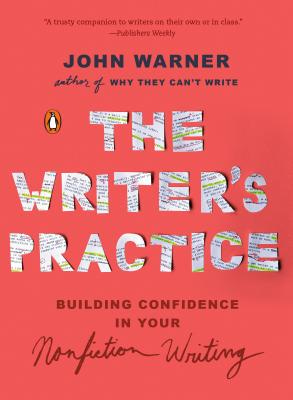
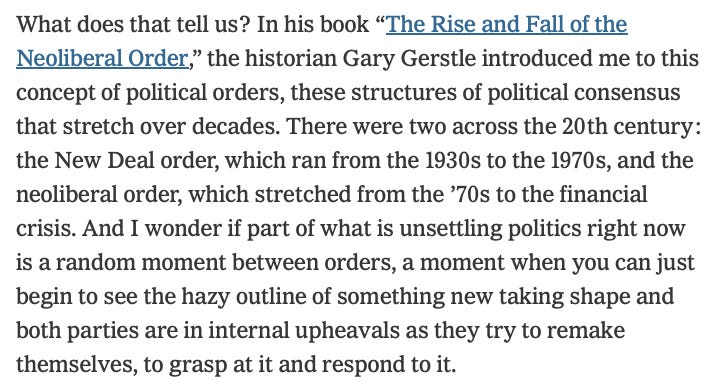
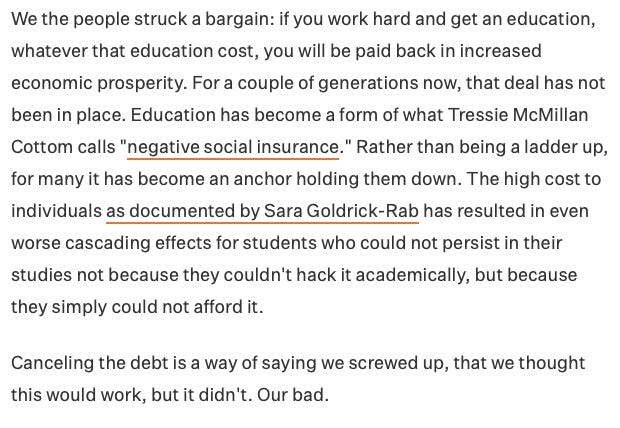
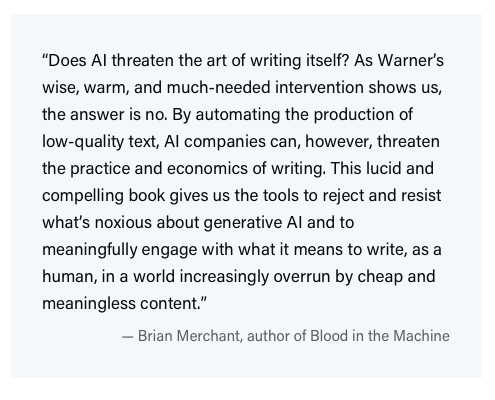
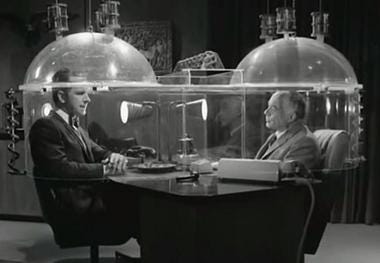
Wow! My personal “history” would have been so much different if only you had been my writing teacher in high school. So appreciate how you think and write! Thank you for sharing your “what if alternate reality” exercise you assign your first year students. I intend to adopt it in my Possibility Partners Unleashing Potential membership community and coaching practice to support people optimizing their influence, impact, and contributions at work making a difference while earning a living. You are such an inspiration!
There’s an episode of the West Wing where (I think it was) Josh and Toby are sitting in a bar and trying to come up with a bold initiative for the administration and they come up with free public college tuition, and it seemed really radical at the time. That entire show was kind of an alternate history. But free college tuition going forward seems more practical and less radical than retroactively forgiving student loans (which I am in favor of btw, but what about the students who take out loans tomorrow…). Anyway I always wondered why we skipped free tuition and went to loan forgiveness and sometimes I think it’s because we libs think that President Bartlet already did that. Which is to say that alternate histories are powerful. If Kamala wins this election Margaret Atwood will have been a bigger factor than Jill Stein.